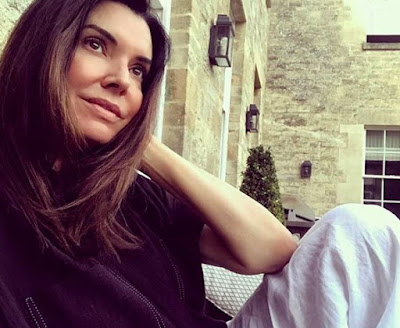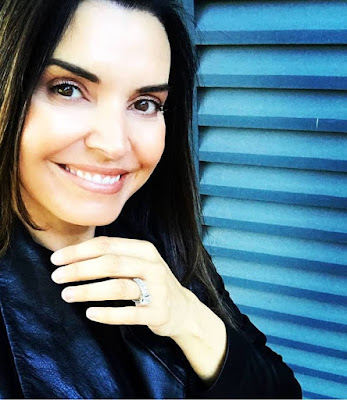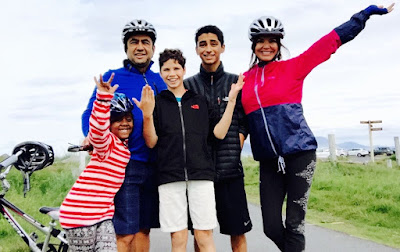She's BACK! Adoptee, mom by birth and adoption, author, speaker, podcast hostess,and truth-teller Michelle Madrid-Branch is here!
Ya'll remember Michelle, right? She's my go-to for adoption authenticity. She's honest, she's encouraging, and she's empathetic. So in honor of National Adoption Month, I invited Michelle to write to you. She chose the topic: "Adoption means many things: normal is not one of them." Riveting, right?
Here's what Michelle wants you to know about adoption:
“Mama,
my friends laughed at me today during recess. We were playing house. Someone
said that I had to be the adopted one in the family, and that I wouldn’t be loved as much as the other
kids who weren’t adopted.”
True words.
Elementary
school.
Playground fun
turned unpleasant.
I
still cringe when I let myself go back in time to that afternoon. I clearly
remember standing under the monkey bars with my head hung low. I felt just
about as isolated and alone as a kid could feel.
Arriving
home after school, I walked down the hallway and made a beeline for my mother’s room. I climbed onto her bed and
crawled into the fetal position.
I began to wail.
My body trembled.
My temples throbbed.
“Mama,
is adoption bad? It feels really bad. Why did my first mommy stop loving me?
What did I do?”
My
mother went on to explain that I had grown inside of my birth mother’s tummy and that she was not able
to keep me with her once I was born. That she loved me so much that she’d made a plan so that another
family could raise me.
My mother ended the conversation with these words:
Adoption
means love. That’s all
you really need to know.
But,
it wasn’t.
It wasn’t all that I needed to know.
My sweet mama,
wholeheartedly, meant the words that she shared with me in her bedroom that
day. As an adult adoptee, and mom-by-adoption, I understand and can
conceptualize that adoption does, indeed, mean love. There is so much love
found within this process of delivery called adoption.
Yet, what I didn’t know as a girl in elementary
school is this: there was so much more that I needed to discover, decode, and
define for myself about being adopted. There was a language that needed to be
learned and spoken. And, this language could not be adequately expressed with
just one word: love.
No, the language of
adoption needs to be fluently felt and vastly expanded upon. This language
needs to be safely explored, sometimes angrily articulated, and openly shared
without judgment. The language of adoption cannot be made antiseptic, or kept
in a clean and tidy box. It needs to be messy.
Real.
Raw.
You
see, as a child, as much as I knew my mother meant these words—adoption means
love—I also knew, for all of my growing up years, that it was far too risky to
share with her my true feelings: I didn’t want to be adopted.
I
didn’t!
I didn’t want the title of adoptee.
I
wanted to be normal.
I
wanted to be like the other kids whose first mommies kept them.
As
much as my mother painted a picture of adoption as normal—I felt deep within
myself that it wasn’t.
Adoption wasn’t normal.
Adoption
isn’t normal.
It’s not normal for the ties that
bind a mother and child to be severed. It’s not normal to wonder who you are, where your brown eyes came
from, and why you savor the sounds of gypsy music.
It’s not normal to wonder if the
woman who gave you life ever thinks of you. It’s not normal to question whether your birth father loves you. It’s not normal to wonder if you have
siblings out there, somewhere.
It’s not normal to feel judged and
discriminated against because you don’t look like your adoptive family members. It’s not normal to be rejected by the parents
who gave you life—no matter their reasons. It’s not normal when trust is an excruciatingly difficult concept to
embrace, because trusting has proven to be a fragile exercise. It’s not normal to miss a crucial part of
yourself and still not know who that person is.
Adoption
is many things.
It is committing to
love a child beyond the borders of bloodline. Adoption is how we are called to
love one another: unconditionally. Adoption is filled with sacrifice—on all
sides. Adoption is family.
Adoption is beautiful.
Adoption is hard. Adoption is a life-long journey. Adoption is complicated.
Adoption is interconnected.
Adoption is
unpredictable: it’s filled
with unexpected twists and turns, entries and exits. Adoption is life and the decisions we make.
Adoption is emotional. Adoption is mysterious and—all too often—consumed by
unanswered questions. Adoption is traumatic. Adoption is triumphant. Adoption
is loss. Adoption is gain.
What adoption is not,
is normal. Adoption is not normal. As a community, we should come to grips with
this truth. What we can no longer do is avoid this fact and thus continue to force
adoptees into silence, afraid to share the complexities of how they really
feel.
Let adoptees find their
own language. Let them express that language fully, fluently, and freely. We
don’t need to force-feed
adoptees some synthetic version of reality in order to sugarcoat the adoption
experience—even if our version is well intended.
We don’t need to numb down the emotions
surrounding adoption—that has never been a fair approach. Adoptees have been
through a profound loss. They’ve
survived an abnormal occurrence. Let them express what that means to them.
Unfiltered.
Uninhibited.
This is how adoptees
can move beyond trauma and on to triumph: by speaking their pain, by expressing
their questions, and letting out what has been bottled up inside.
We, as their families,
should understand that an adoptee’s
longing for knowledge and for unvarnished truth is a natural and healthy
yearning. We can no longer pretend that adoption is normal and ask of our
children to play this game along with us. We should stop pretending.
We should acknowledge
that adoption is not normal. And, as we do so, we free our children to express
what they really feel. We give them space to share how being adopted is being
experienced in their day-to-day lives. We need to encourage adoptees to share
what is real. We need to hear them. We need to listen to them without judgment.
We need to stand by them in this way. Let this be the new norm for adoption.
Unwaveringly.
Unendingly.
---
Love what you read? Learn more from Michelle from her site, Twitter, Facebook, Instagram, and book.



















